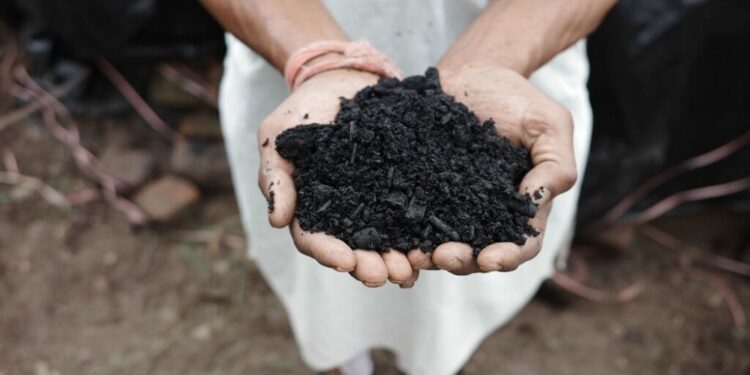Gardening offers more than beauty. It connects people to nature, improves mental health, and creates sustainable spaces. Yet, nurturing a thriving garden requires more than water and sunlight. Enter biochar—a simple, effective solution for healthier plants and a greener planet.
What is Biochar?
Biochar is a type of charcoal made from organic materials like wood, crop residues, or manure. It’s produced through pyrolysis—a process that heats organic waste in a low-oxygen environment. This method locks carbon into the material, creating a porous, carbon-rich product that benefits soil in several ways.
Not just a trend, biochar has roots in ancient agricultural practices. Farmers in the Amazon basin used it centuries ago to enrich their soils. Today, biochar is gaining attention for its environmental and gardening advantages.
The Benefits of Using Biochar in Your Garden
Biochar transforms soil health. Its structure improves water retention, reducing the need for frequent irrigation. This is especially useful in areas prone to drought.
Key Advantages:
- Enhanced Soil Fertility: Biochar boosts nutrient availability. Its porous surface holds essential nutrients, preventing them from washing away.
- Improved Drainage: It prevents waterlogging by promoting proper drainage, even in heavy clay soils.
- Microbial Haven: The porous nature provides a home for beneficial microorganisms, enhancing soil biodiversity.
- Carbon Sequestration: Using biochar helps fight climate change by locking carbon in the soil for centuries.
- Pest Resistance: It can reduce the impact of soil-borne pests, leading to healthier plants.
How to Use Biochar in Your Garden
Using biochar is straightforward. However, preparation ensures maximum effectiveness. Fresh biochar may absorb nutrients, temporarily depriving plants. To avoid this, “charge” the biochar by soaking it in a nutrient solution or compost tea before application.
Simple Steps:
- Prepare the Biochar: Activate it by mixing it with compost or fertiliser. Let it sit for a few days.
- Incorporate into Soil: Mix it into the top 6-12 inches of soil for optimal results.
- Monitor Results: Notice improved plant growth and soil health over time.
Why Choose Biochar Over Traditional Amendments?
Unlike chemical fertilisers, biochar offers long-term benefits without harming the environment. It remains in the soil for decades, reducing the need for frequent applications. Plus, it’s made from renewable resources, making it a sustainable choice for eco-conscious gardeners.
Environmental Impact of Biochar
Biochar does more than enhance gardens. It tackles pressing environmental challenges. When organic waste decomposes naturally, it releases greenhouse gases. Pyrolysis prevents this, locking carbon into a stable form. By choosing biochar, gardeners contribute to a larger effort to combat climate change.
Supporting Sustainability:
- Reduces agricultural waste.
- Decreases the need for synthetic fertilisers.
- Promotes circular economies by repurposing organic materials.
Where to Buy Biochar
Quality matters when selecting biochar. Look for products sourced sustainably and free from contaminants. Many suppliers offer biochar in varying grades to suit different gardening needs. Purchasing from reputable sources ensures you’re investing in a product that delivers results.
Ready to make the change? It’s time to buy biochar and transform your gardening journey. By incorporating this versatile amendment, gardeners can cultivate thriving plants while supporting the planet.
In conclusion, biochar is more than a soil additive; it’s a tool for sustainability. Whether you’re a seasoned gardener or a novice, this eco-friendly product offers measurable benefits for your garden and the environment. Invest in biochar today and create a greener tomorrow.










